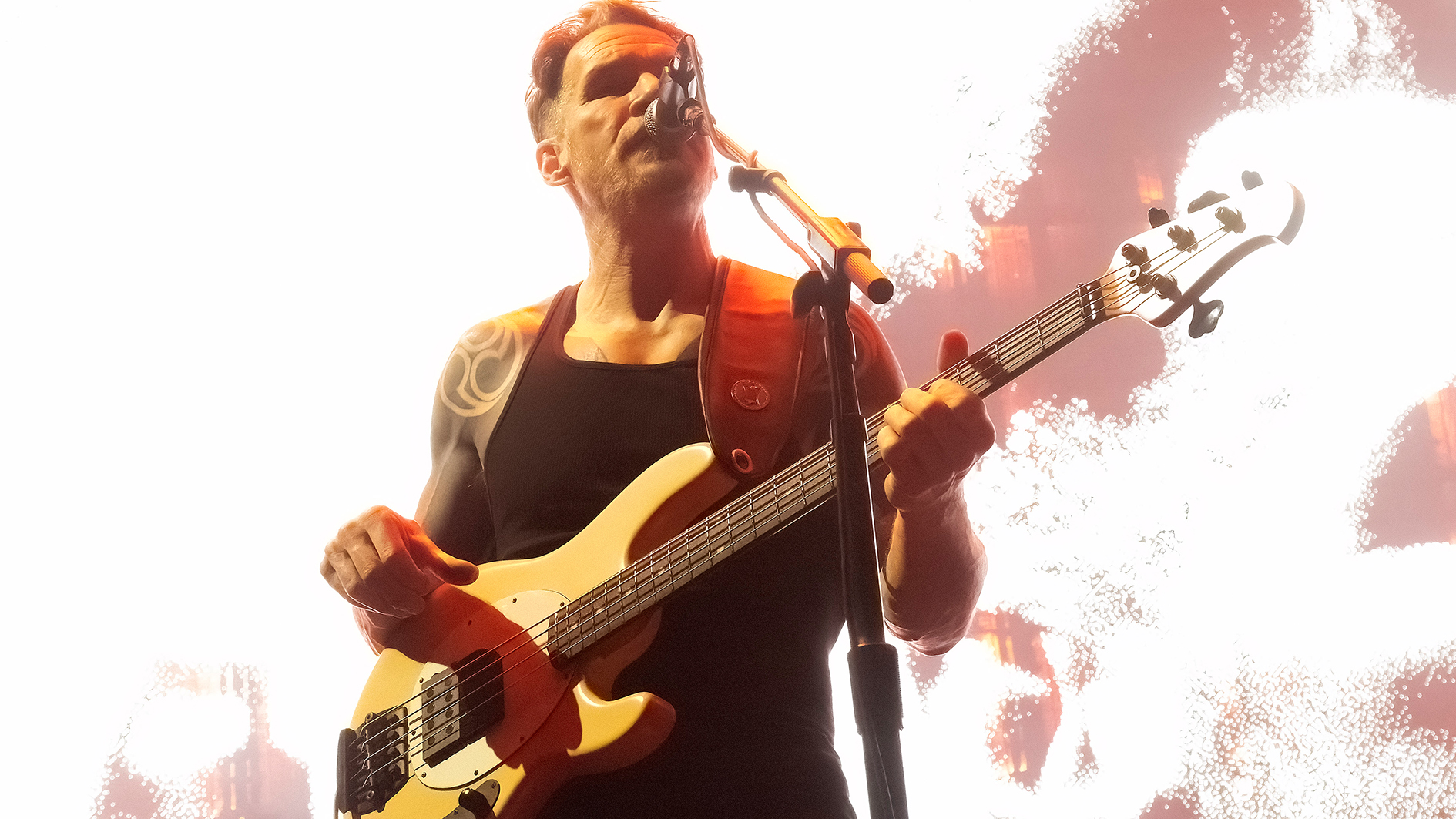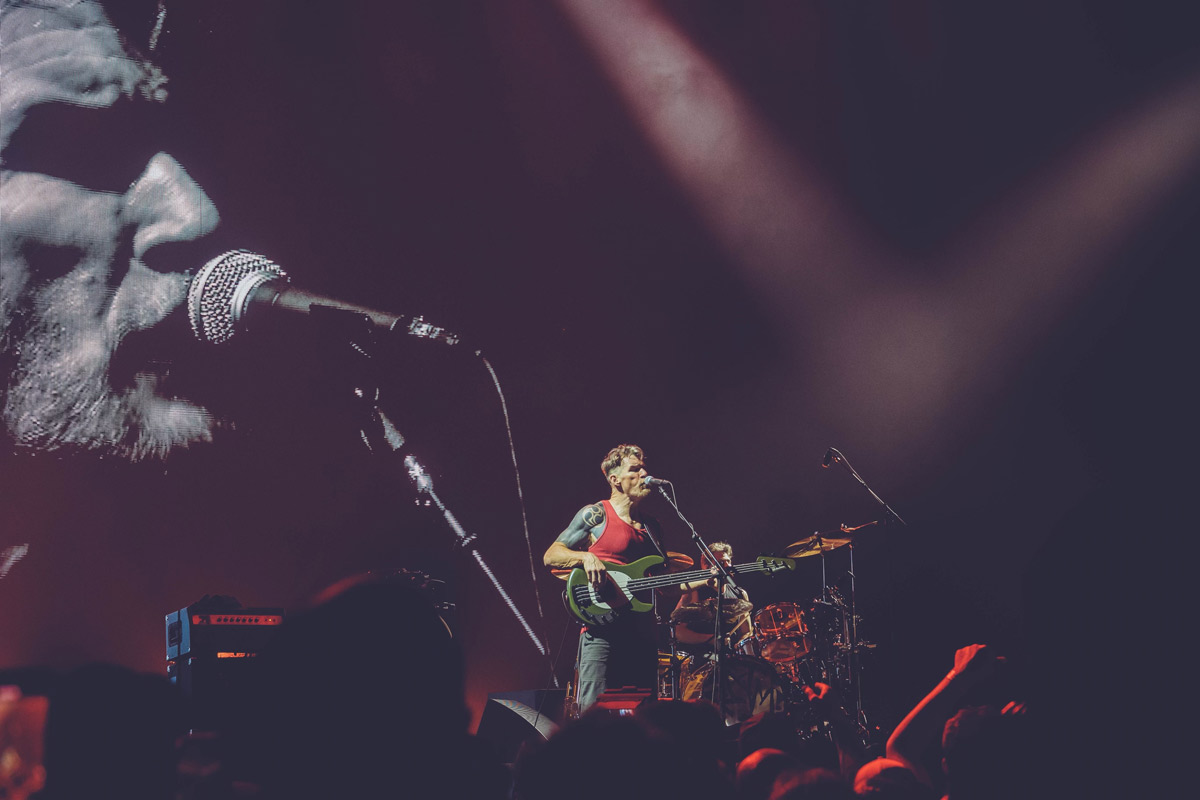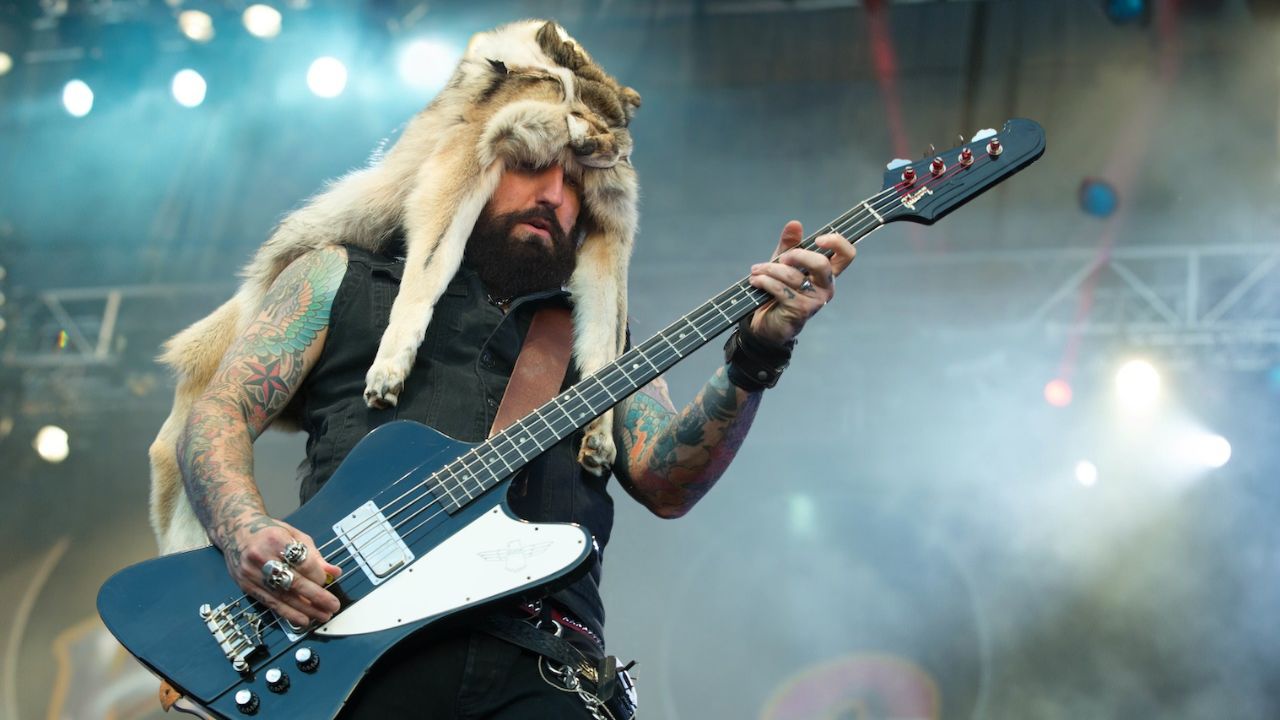Tim Commerford and Jonny Polonsky on the unlikely origins and promising future of their eclectic new trio project, 7D7D
The Rage Against the Machine bassist on why playing with Polonsky is like “jamming with Hendrix”, and his failed experiments with short-scale basses in RATM
![[L-R] Tim Commerford and Jonny Polonsky](https://cdn.mos.cms.futurecdn.net/Qp6KwQp7utSnfC5jHaNaAA.jpg)
All the latest guitar news, interviews, lessons, reviews, deals and more, direct to your inbox!
You are now subscribed
Your newsletter sign-up was successful
Tim Commerford recently wrapped up a North American tour with Rage Against the Machine, but he’s already back with a new project, 7D7D, for which he handles bass guitar and lead vocals alongside drummer Mathias Wakrat (with whom he previously played in the trio Wakrat) and guitarist Jonny Polonsky (whom he has a long musical history with, including in the band Big Nose).
It's a diverse lot of musicians, and the band’s sound, as evidenced by their debut single, Capitalism, is likewise unconventional. Built upon propulsive beats, shifting time signatures, thick, darting basslines and livewire guitars, the tune lays serious lyrics (“No matter where I am / I’m in hell,”) over a jaunty, at times almost carnivalesque atmosphere.
According to Commerford, this is one of their more straightforward tunes. “Most of the songs that we've done have been more challenging,” the bassist says. We’ll soon find out for ourselves, as he assures there’s much more to come from the trio. In the meantime, Guitar World sat down with Commerford and Polonsky to get the scoop on the past, present and future of 7D7D.
How did this project come to be?
Jonny Polonsky: “I hadn't talked to Tim in a bunch of years, but he called me out of the blue last summer and he said he had this thing he was working on. I guess he and Mathias had had their other band, Wakrat, and Tim wanted to still play with Mathias but also do something brand-new. He sent me a track and said, ‘Do whatever you want.’ So I did. They dug it, and we kept it going.”
Tim Commerford: “Mathias and I have been playing for many years, and I love playing with him. He's a punk drummer, but he's got like a very jazzy kind of feel as well. He's very syncopated, and almost electronic. I love the freshness of what he's doing, and it's really easy for me to go into the studio, pull up one of his beats, trip out on it and create songs.
“And when we write a song, Mathias and I do the whole thing – bassline, drum beat, lead vocal and backing vocals. Then we had been looking for guitar players, and I just went, ‘Jonny Polonsky’. In my career as a musician, there's only been a couple people that I would put in the category of a Jonny Polonsky.”
All the latest guitar news, interviews, lessons, reviews, deals and more, direct to your inbox!
I got exposed to Jonny as a guitarist and I was just like, ‘This is like jamming with Hendrix.’
Tim Commerford
How so?
Commerford: “Jonny Polonsky is like a human jukebox. My first encounter with Jonny was when I was with Audioslave and he was an assistant in the studio when we were working with Rick Rubin. Rick had signed him to his label, and he was very young.
“And I remember being in the studio with everyone, working hard on arrangements and trying to nail everything down, and then taking a lunch break and going into the control room… and Jonny Polonsky was in there playing the entire arrangement, on the piano, with the vocal melody and everything. It blew me away. He really is on that next level. Dude is so talented.
“Later on, after Audioslave, we went through a period where me and [Rage Against the Machine and Audioslave drummer] Brad [Wilk] and Jonny jammed together in a band we called Big Nose. I got exposed to Jonny as a guitarist and I was just like, ‘This is like jamming with Hendrix.’ Or as close as I'm gonna get to jam with someone who can play like that, at least.”

Jonny, how did you approach the guitars in 7D7D?
Polonsky: “Whenever I would get music from them, it would have everything there – bass, drums and lead vocal – which was really interesting. I've never worked that way before. And I mean, these songs are unusual. I love a lot of different kinds of music and I've played with a lot of different kinds of people, but this was super-challenging, in the best way.
“So typically, they’d send a track, and how it would go is that for the first 10 or 15 minutes, I'm just like, ‘What is this?’ [Laughs] Then I'll start playing along and just messing around and then eventually I'll latch onto something that sounds like it's working.
“And the thing is, there’s never any standard riffs or strumming, like the Ramones or something like that. It’s more like these independent entities trying to coexist at the same time. And that’s cool to me, because I really love players like Duane Denison from the Jesus Lizard, Keith Levene from Public Image Ltd., John McGeoch, James Honeyman-Scott, all these different guitar players that have never really come out my playing before, but that this music brings out of me.
“That sort of melodic, post-punk thing. That’s one of the great things about playing with different people – it brings out different aspects of your personality. And what's the point of doing something unless it's gonna be something new?”
There's people that don't have healthcare... and then there's billionaires. I mean, I have to write about that. I have to be angry about that. That is an obligation
Tim Commerford
Commerford: “When we send a track to Jonny, it always comes back in, like, a day. It's so crazy. And it’s always some weird shit that I would've never thought of. But it’s musical and it works and it just makes me and Mathias sound way better. That's the truth of it.”
The one 7D7D song we’ve heard so far is Capitalism. How did that one come together?
Commerford: “The song is built off the drum beat. That opening beat is kind of a signature Mathias thing. And that dictated the music. Then lyrically, the idea of capitalism, I mean, that’s at the root of everything, right? And look, I get a lot of shit, like, ‘Oh dude, you're a rock star. You should never talk about what's up in the world.’ But you could just look at it simply by just going, ‘There's people that don't have healthcare... and then there's billionaires.’
“I mean, I have to write about that. I have to be angry about that. That is an obligation. I feel obligated to make music that has something to say. I don't give a fuck if people like it or not. And musically, I like how the lyric is treated in a really happy, goofy way in the chorus. Instead of just playing minor chords my entire career, I wanted to try to play a major chord and put this fucked-up lyric on it and make it sound dark.”

Jonny, how did you compose your parts on the song?
Polonsky: “I used this old Strat that I had built out of Warmoth parts when I was a teenager. It has Lace Sensor pickups and it sounds great. I started playing around with that and I was making myself laugh, because I was thinking about songs like Some Like It Hot by The Power Station, or Hot Hot Hot by Buster Poindexter. Almost like a calypso thing.
“And there’s probably some John Frusciante/Chili Peppers in the right hand, and a very Adrian Belew, kind of skronky, weedy guitar tone, especially in that last section. But in general I just react to what they give me. And sometimes it's immediate and sometimes I have to play around with stuff for a while.”
What other gear are you using with 7D7D?
Polonsky: “I have a Gibson Melody Maker, I think it's a Joan Jett signature model, that I got off of Reverb, and I used that a lot. I also have a Rherry Red Gibson Flying V that I bought during lockdown, because I always wanted a Flying V.
“And you know, I was half-expecting to be like, ‘Oh man, I can't play this.’ I thought it’d be cumbersome. But it sounds really great and it feels fantastic. Then I also used a [Gibson] SG with P-90s, a Squier Bass VI, a First Act 12-string electric that they made me years ago and an Ernie Ball Music Man Goldie, the St. Vincent model.”
When you're playing in unison with another player, a short-scale is not the way to go, because the string moves a little more under your left hand and it's easier to pull it a little bit out of tune
Tim Commerford
Tim, what was your main setup?
Commerford: “I have this amp that I got from [producer] Brendan O'Brien. It's an Ampeg, I think a ’68 maybe, and it’s a 15-inch flip-top. It's so fucking cool. And it’s really just that with maybe a little dirt on it. Then for basses, I had my [signature Ernie Ball] StingRay, and I've been using the short-scale, man. And I'm gonna tell you, the short-scale Stingray is a thing of beauty.
“Over the course of being a bass player, I never played a short-scale. I never allowed myself to realize that it actually has a darker sound. But when I went in to play with Rage on this recent tour, initially I brought the short-scales. I was like, ‘They're lighter, they're smaller, I don't care if it makes me look weird, it's gonna be cool!’
“So we went into rehearsals and I was playing nothing but short-scales. But when you're playing in unison with another player, a short-scale is not the way to go, because the string moves a little more under your left hand and it's easier to pull it a little bit out of tune. Which makes things difficult when you’re doing the unison riff thing, which Tom [Morello] and I do a lot.
“So I switched back to the long-scale for that tour. But for this thing with Jonny, we’re never play riffs together. We never lock in on anything together, ever. Every instrument is doing something different, so I don't have to worry about the unison thing. So the short-scale is the way to go.”

Finally, what’s next for 7D7D?
Commerford: “We're gonna start by dropping one new song each month. And we’ve talked about putting out a record out, and I'm sure we will. The idea is to build a little bit of a catalog so that we can eventually play shows.”
Polonsky: “I'm sure we will play shows. That’ll happen at some point. And we have so much more music we’ve recorded, and also that we’re working on. It’ll all come out at some point.”
Commerford: “I was telling Jonny the other day, I don't even know what this thing is, man. But it could be anything. It could be something that we can continue to do as we grow old, it could be a platform to be artistic and be political and just do whatever we want. I don’t know.
“But what I do know is that I feel lucky. I tell everyone, ‘You're lucky if you're in a band.’ I don't care if you just have a couple buddies coming over and you’re playing in your living room. You're lucky. Because it's not easy to get together with people and create art, you know? But when you can do it, it's a beautiful thing.”
- 7D7D's latest single, Misinformed, is out now via Mad Bunny Records.
Rich is the co-author of the best-selling Nöthin' But a Good Time: The Uncensored History of the '80s Hard Rock Explosion. He is also a recording and performing musician, and a former editor of Guitar World magazine and executive editor of Guitar Aficionado magazine. He has authored several additional books, among them Kurt Cobain: Montage of Heck, the companion to the documentary of the same name.

